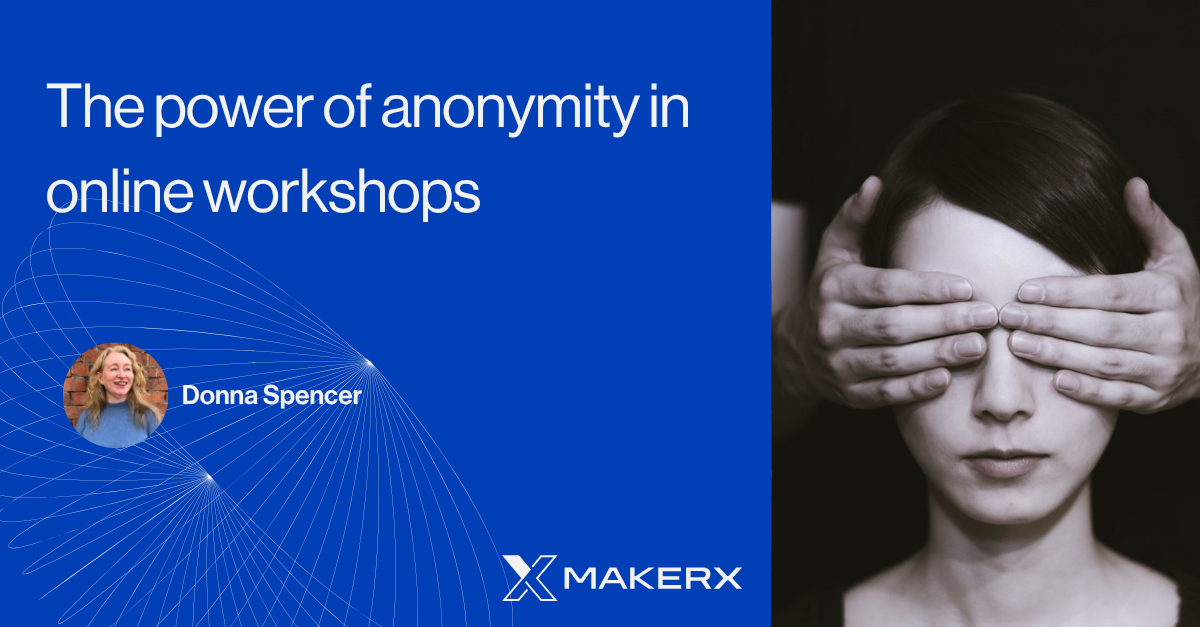The power of anonymity in online workshops
Anonymous participation in a series of client workshops brought much better engagement than I expected. I explain why I think it might have happened.

In a recent client project last year, I'd planned a 6-week series of workshops - to identify current problems, generate potential solutions, and decide on next steps. We planned to duplicate workshops to work around people's availability; and we set the long-ish time period to give everyone some thinking space in between.
The client was located in a single city, so I knew that in-person workshops would allow great coverage of the team and contribution. And I love in-person workshops for the benefit of making things with our hands and energetic discussions.
Alas, it wasn't to be, and we switched to a series of online workshops instead.
Now, my absolute most important goal with any kind of workshop is to make sure that everyone can contribute their knowledge and ideas with little friction. Where everyone is comfortable getting involved, feel like they have all the skills needed and know that their contribution won't have repercussions.
For an online workshop, the first friction people can experience is having to create an account in a tool. It may seem trivial, but we all have too many signups for things we don't need, and who knows how our personal information is being used? I don't want to lose someone before we even start. I'm really glad my two favourite online workshop tools (Mural and Miro) both have guest access. It's literally the most important thing I consider when assessing a tool.
So, clearly, I allowed people to join the workshop as guests, and let them know this ahead of time. This is what the screen looks like when someone joins as a guest:


Imagine my surprise when this turned out to be the best decision of the entire workshop series! (You might not be surprised - in hindsight it was completely obvious to me too. And you probably read the article headline...)
In the first workshop I noticed immediately that:
- people started contributing faster than I expected - I didn't have to coax them to get started
- people contributed more ideas than I expected and continued for longer than I usually see
- the contributions were more diverse than I expected, with more issues raised
- contributions also overlapped a lot, which shows which issues are common across the group
- sensitive and unpopular ideas were included
- people came back to future sessions
This pattern then continued for the entire period - it wasn't just a fluke from the first session.
What might be happening here?
- People didn't wait for those of higher rank or more power to share their experience first (because they couldn't tell who was who). I always see this during both in-person and online workshops and usually have to actively work around it.
- People didn't watch the screen to see who was saying what - instead they just got started, thinking about their own ideas and contributing quickly. Once they are in their own head (and again, not worrying about what everyone else was doing) they wrote more ideas and wrote for longer.
- Because they were head down focused on writing down their ideas, many contributed the same idea. I usually see people deleting (or screwing up) notes when they see that someone has already added an idea. This is really important as it's good to know which are consistent issues or ideas, and what are one-offs.
- When you don't have to worry that your idea is going to have some kind of repercussion you are more likely to say it (personal story - a few years ago I was a workshop participant and didn't contribute my experience as I knew my manager was watching and they had previously criticised me for 'being negative').
- When you see that your ideas can be incorporated and considered, you are more likely to come to a follow-up session (I've seen many workshops where people felt unheard, and they don't do that twice!)
Some caveats on my insights:
- I didn't run a comparison between identified and non-identified groups - this isn't a scientific or definitive conclusion - it is just based on my observation. But at the same time I was running lots of workshops with my student groups, who all had accounts and were signed in. I also have years of experience with the flow of online and in-person workshops so know what to expect.
- This particular organisation was quite hierarchical and people deferred to the experience of their managers. This may not be the case in your context or a less hierarchical organisation.
- I kept the activities very simple (writing on sticky notes and grouping them) which does help people contribute.
- As a facilitator, I don't always have a strong understanding of which topics are sensitive and unpopular. Here my client contact gave a lot of context and was also surprised that people were game enough to introduce some of the ideas.
So next time you are going to run an online workshop, consider whether people need to identify themselves, or if anonymous might work out better for you.

